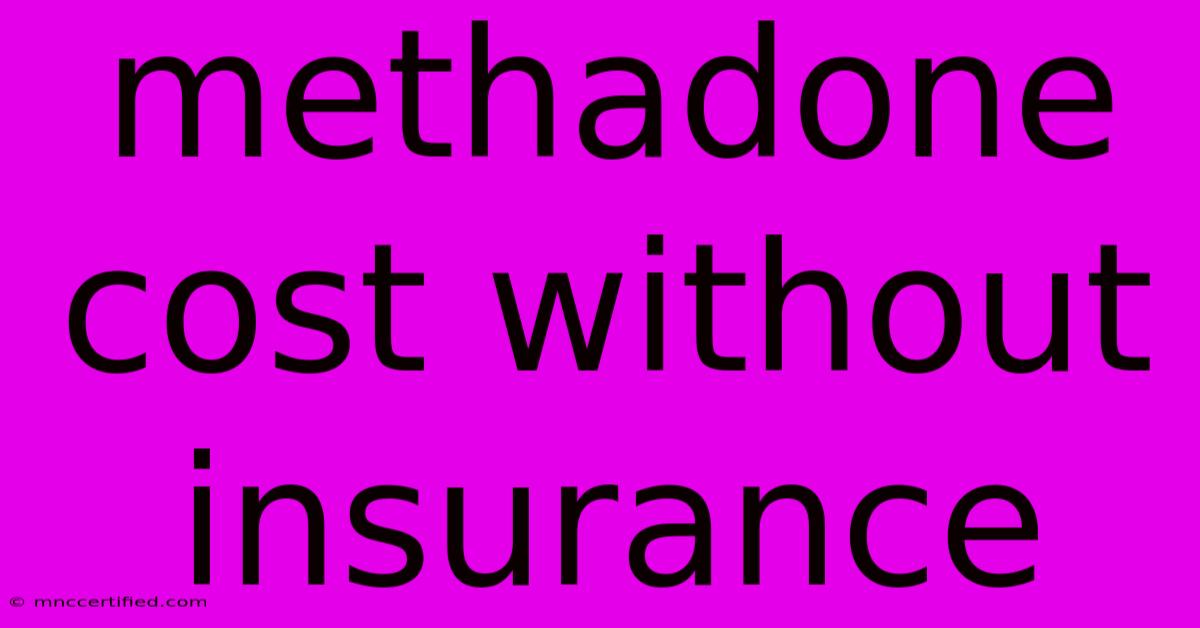Methadone Cost Without Insurance

Table of Contents
Methadone Cost Without Insurance: A Comprehensive Guide
The cost of methadone treatment without insurance can be a significant barrier for individuals seeking help with opioid addiction. Understanding the potential expenses involved is crucial for making informed decisions and accessing the necessary care. This article will explore the various factors influencing the price of methadone, strategies for reducing costs, and resources available to those without insurance coverage.
Factors Affecting Methadone Treatment Cost Without Insurance
Several factors contribute to the overall cost of methadone treatment without insurance. These include:
- Clinic Location: Costs vary significantly depending on geographical location. Urban areas often have higher costs than rural areas due to overhead and market demand.
- Clinic Type: Private clinics generally charge more than those run by non-profit organizations or government agencies. The level of services offered (e.g., individual therapy, group counseling) also impacts pricing.
- Frequency of Visits: The number of required visits per week directly impacts the overall cost. More frequent visits translate to higher expenses.
- Additional Services: Methadone maintenance treatment (MMT) often includes other services like counseling, drug testing, and case management. The inclusion and cost of these services will influence the overall price.
- Medication Dosage: The prescribed dosage of methadone can also influence costs. Higher dosages naturally lead to higher expenses.
Average Cost of Methadone Without Insurance
Providing an exact average cost is difficult due to the varying factors mentioned above. However, anecdotal evidence and reports suggest that the daily cost of methadone alone can range from $10 to $50 or more without insurance. This does not include the costs of additional services like counseling or drug testing, which can add substantially to the overall expense. Therefore, individuals should expect to pay significantly more than just the cost of the medication.
Finding Affordable Methadone Treatment
Navigating the cost of methadone without insurance can be challenging, but several strategies can help:
- Explore Public Health Clinics: Public health clinics and non-profit organizations often offer more affordable or sliding-scale payment options for methadone treatment. These clinics are dedicated to providing accessible and affordable care.
- Seek Financial Assistance Programs: Investigate local and national organizations that provide financial assistance for substance abuse treatment. Many foundations and charities offer grants or subsidies to help cover treatment costs.
- Negotiate Payment Plans: Some clinics may be willing to work with patients to establish payment plans that fit their budgets. It's crucial to openly communicate financial limitations with the clinic staff.
- Look into State and Local Programs: Your state or local government might offer assistance programs specifically designed to support individuals seeking addiction treatment. Research available resources within your community.
The Importance of Seeking Treatment Despite Cost
While cost is a major concern, it's critical to remember that the benefits of methadone treatment far outweigh the financial burden for many individuals. Methadone, under medical supervision, can significantly reduce cravings, withdrawal symptoms, and the risk of relapse. Ultimately, the cost of not receiving treatment—including potential health complications, legal issues, and lost productivity—can be far greater than the financial investment in treatment.
Finding Help and Resources
Several resources can help individuals locate affordable methadone treatment and financial assistance:
- SAMHSA National Helpline: 1-800-662-HELP (4357) - This confidential, free, 24-hour-a-day, 365-day-a-year, information service, in English and Spanish, provides referrals to local treatment facilities, support groups, and community-based organizations.
- Substance Abuse and Mental Health Services Administration (SAMHSA): The SAMHSA website offers comprehensive information on substance abuse treatment, including locating treatment facilities and resources.
- National Institute on Drug Abuse (NIDA): NIDA provides research-based information on drug addiction and treatment.
Disclaimer: This article provides general information and should not be considered medical advice. Always consult with a healthcare professional or addiction specialist for personalized guidance and treatment options. The costs discussed are estimates and may vary based on location and specific circumstances.

Thank you for visiting our website wich cover about Methadone Cost Without Insurance. We hope the information provided has been useful to you. Feel free to contact us if you have any questions or need further assistance. See you next time and dont miss to bookmark.
Featured Posts
-
Jaguars Modernist Rebrand Debuts
Nov 21, 2024
-
Money Wealth Life Insurance Book
Nov 21, 2024
-
Live Nvidias Blackwell Ai Chip
Nov 21, 2024
-
Gere Scolds Guthrie On Today Show
Nov 21, 2024
-
Erie Insurance Arena Seating Map
Nov 21, 2024